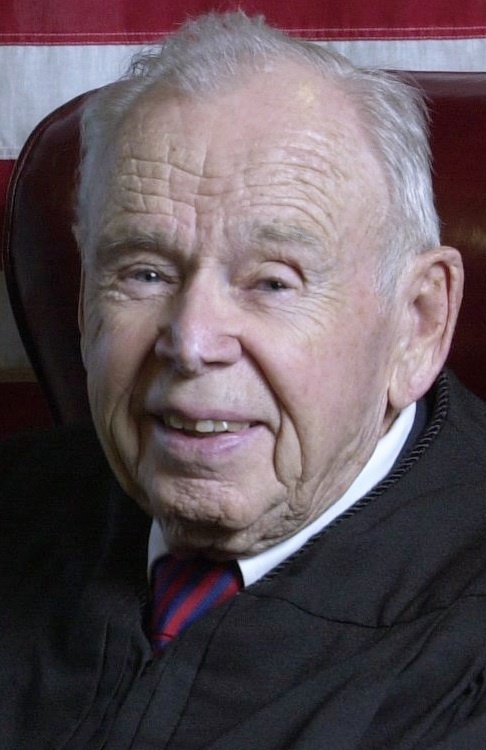WICHITA, Kan. — As the oldest sitting federal judge in U.S. history, Judge Wesley Brown allowed himself few concessions to his advancing age, insisting on presiding over significant and often complex cases right up until his death at 104.
Brown died Monday night at a Wichita assisted living center, his U.S. District Court law clerk said Tuesday.
During his long tenure, the senior judge in Wichita repeatedly tried to explain why he had not yet fully retired from the federal bench.
“As a federal judge, I was appointed for life or good behavior, whichever I lose first,” Brown quipped in a 2011 interview with The Associated Press. How did he plan to leave the post? “Feet first,” Brown said.
He came to work at the federal courthouse every day until about a month ago when his health deteriorated, said U.S. District Judge J. Thomas Marten. Undeterred, the ailing Brown then had his law clerks bring work to the hospital, and later to the assisted living center while he recuperated. His law clerks were with him virtually nonstop, taking turns to be there except at night during the past few weeks.
He was appointed in 1962 by then-President John F. Kennedy.
“When Judge Brown spoke, we listened because – while nobody has seen it all – he certainly came closer to it than anybody I have ever known,” Marten said. “And his message was always the same: Remember who you are and what your job is.”
In 1979, Brown officially took senior status, a type of semiretirement that allows federal judges to work with a full or reduced case level. He continued to carry a full workload for decades.
“I do it to be a public service,” Brown said in the AP interview. “You got to have a reason to live. As long as you perform a public service, you have a reason to live.”
His long tenure on the federal bench – he was appointed in 1962 by then-President John F. Kennedy – surpasses even that of Joseph Woodrough, a judge on the U.S. Court of Appeals for the 8th Circuit. Until Brown, he had been the longest-practicing judge in the federal judiciary. Woodrough died in 1977 shortly after turning 104.
“Judge Brown always said he hoped he would be remembered as a good judge, not just an old judge – and I think it was a sincere concern of his,” said U.S. District Judge Eric Melgren.
As a federal judge, Brown could have retired at full salary, but he never had a real interest in that, Melgren said.
Brown’s stooped frame nearly disappeared behind the federal bench during hearings. His gait was slower, but his mind remained sharp as he presided over a tightly run courtroom even after turning 104 last June.
Brown removed himself from the draw for assignment of new criminal cases in March, and by the time he died he was no longer presiding over hearings. He kept an active civil caseload, but during the last months of his life referred evidentiary hearings on his remaining civil cases to magistrate judges for their recommendations before making a decision.
“I will quit this job when I think it is time,” Brown said last year. “And I hope I do so and leave the country in better shape because I have been a part of it.”
One of his law clerks, Michael Lahey, said Brown took a turn for the worse just a week before his death.
“He finally wore out,” Lahey said. “He maintained his abilities right up to the end.”
Assistant U.S. Attorney Brent Anderson recalled an incident that occurred when Brown was about 98. A cellphone started ringing in the courtroom – twice. Nervous lawyers pulled out their phones to make sure they were turned off. Then, while sorting through some paperwork on the bench, the judge realized it was his own cellphone that was ringing.
“He immediately fined himself $100 and held himself in contempt, and said, ‘I guess I learned my lesson,”‘ Anderson recalled.
Send questions/comments to the editors.



Success. Please wait for the page to reload. If the page does not reload within 5 seconds, please refresh the page.
Enter your email and password to access comments.
Hi, to comment on stories you must . This profile is in addition to your subscription and website login.
Already have a commenting profile? .
Invalid username/password.
Please check your email to confirm and complete your registration.
Only subscribers are eligible to post comments. Please subscribe or login first for digital access. Here’s why.
Use the form below to reset your password. When you've submitted your account email, we will send an email with a reset code.